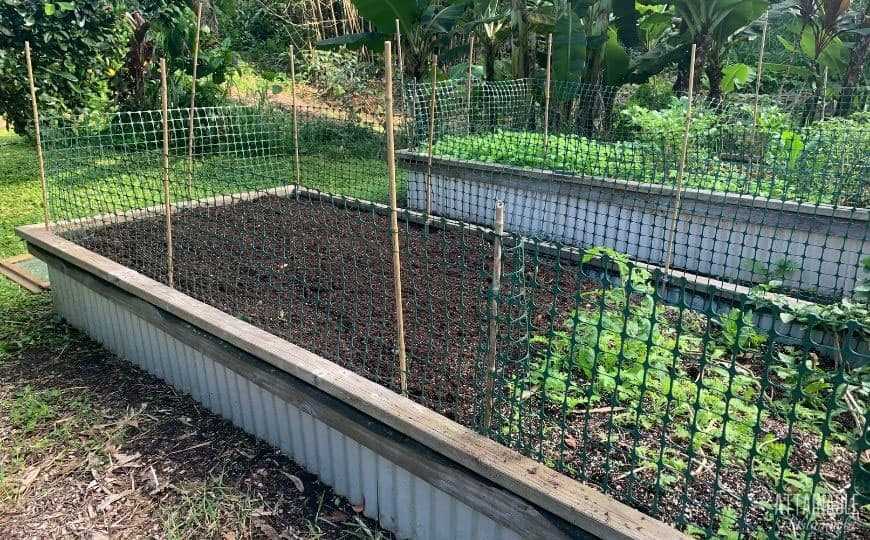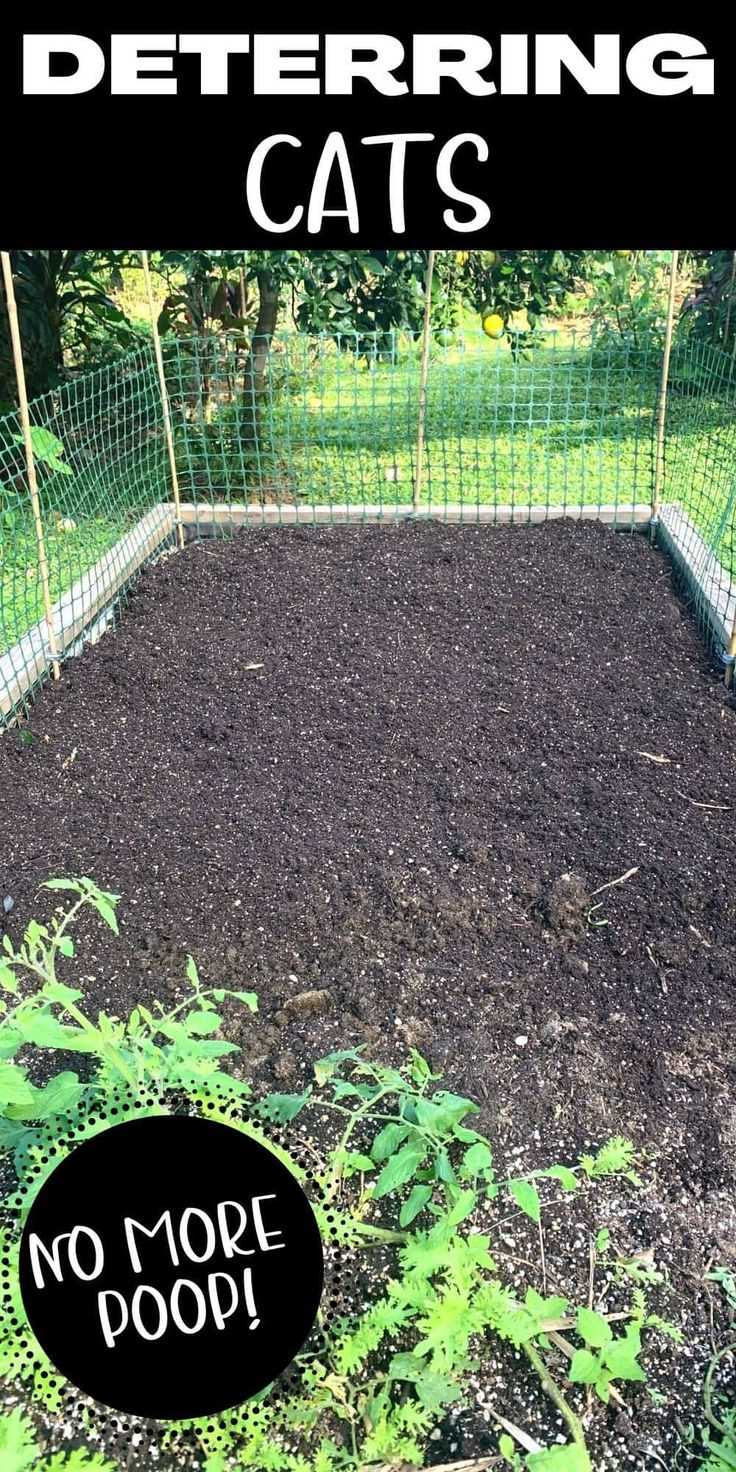



Planting citrus trees or using citrus peels around the perimeter is an effective way to create a natural barrier. The scent of oranges, lemons, or limes is unpleasant for many furry intruders. Scatter these peels regularly to maintain the aroma.
Utilizing netting or fencing can physically block access to the area. A sturdy barrier around the plants not only protects them but also deters animals from entering. Ensure the fence is high enough and buried slightly underground to prevent digging.
Incorporating specific herbs, such as lavender or rosemary, can also help. The strong scents of these plants often repel curious noses. Plant them near the edges or in between the rows of vegetables to create an aromatic boundary.
Motion-activated devices that emit sounds or sprays can startle unwelcome visitors. Position these gadgets strategically to cover the entire area. The sudden noise or burst of water can effectively discourage repeated visits.
Lastly, using a combination of these strategies will enhance the overall effectiveness. Experiment with different methods to discover what works best in your specific situation. Keeping the area secure will allow your plants to flourish without unwanted guests.
Strategies to Deter Felines from Your Edible Plants
Utilize citrus peels around the perimeter; the scent is unappealing to many four-legged visitors. This method is simple and natural, plus it adds nutrients to the soil as they decompose.
Install motion-activated sprinklers. The sudden burst of water can startle uninvited guests, teaching them to avoid the area quickly. It’s an effective way to protect your precious produce without harm.
Consider using chicken wire or other types of fencing. Burying the edges a few inches underground prevents digging, while the height can deter jumping. This creates a solid barrier against intruders.
Plant herbs like rosemary or lavender nearby. The strong scents repel many animals, making the vicinity less inviting. Plus, these herbs enhance culinary dishes, so it’s a win-win situation.
Commercial repellents are available as well. Look for those that contain natural ingredients and are safe for plants. Applying these around your plots can discourage curious creatures from wandering in.
Train a dog to patrol the area. A friendly canine companion will naturally deter smaller animals. Just make sure they enjoy the outdoors without causing chaos among the plants.
For more insights into pet behavior, check out what happens if a cat eats its own poop.
Utilizing Natural Deterrents to Repel Cats

For a successful barrier against unwanted furry visitors, I recommend using citrus peels. Rubbing orange or lemon peels around the area creates an unpleasant aroma that most felines dislike. Simply scatter the peels in strategic spots to enhance the effect.
Another option is coffee grounds. Sprinkling used coffee grounds not only adds nutrients to the soil but also emits a scent that deters many critters, including the ones I want to avoid. They also help with pest control, making it a two-for-one solution!
Herbal Solutions

Herbs like rosemary and lavender offer dual benefits: they smell great to humans and act as a natural repellent for furry intruders. Planting these herbs around the perimeter can provide a fragrant yet effective barrier.
Additionally, consider using vinegar as a spray deterrent. Mixing equal parts of vinegar and water creates a solution that can be sprayed on the soil. The strong scent will keep unwanted visitors at bay, while also being safe for plants.
Creating Physical Barriers for Garden Protection

Install sturdy fencing at least 4 feet high with a buried bottom edge to prevent burrowing. Use materials like chicken wire or hardware cloth for durability.
Consider using raised beds with solid sides. They not only elevate plants but also create a natural barrier. A height of at least 12 inches can deter intrusions effectively.
Implement row covers or netting over plants. This keeps unwanted visitors away while allowing sunlight and rain to nourish the crops.
Utilizing garden stakes with reflective tape can serve as a visual deterrent. The flickering light confuses and discourages intruders.
Plant thorny shrubs or dense hedges around the perimeter. This adds an additional layer of protection and can enhance the overall aesthetics of the area.
Employ motion-activated sprinklers to surprise intruders with a burst of water. This unexpected action can quickly make them rethink their approach.
For temporary measures, use wire mesh or garden netting laid flat on the soil. This can disrupt any digging attempts and protect seedlings.
Video:
Planting citrus trees or using citrus peels around the perimeter is an effective way to create a natural barrier. The scent of oranges, lemons, or limes is unpleasant for many furry intruders. Scatter these peels regularly to maintain the aroma.
Utilizing netting or fencing can physically block access to the area. A sturdy barrier around the plants not only protects them but also deters animals from entering. Ensure the fence is high enough and buried slightly underground to prevent digging.
Incorporating specific herbs, such as lavender or rosemary, can also help. The strong scents of these plants often repel curious noses. Plant them near the edges or in between the rows of vegetables to create an aromatic boundary.
Motion-activated devices that emit sounds or sprays can startle unwelcome visitors. Position these gadgets strategically to cover the entire area. The sudden noise or burst of water can effectively discourage repeated visits.
Lastly, using a combination of these strategies will enhance the overall effectiveness. Experiment with different methods to discover what works best in your specific situation. Keeping the area secure will allow your plants to flourish without unwanted guests.
Strategies to Deter Felines from Your Edible Plants
Utilize citrus peels around the perimeter; the scent is unappealing to many four-legged visitors. This method is simple and natural, plus it adds nutrients to the soil as they decompose.
Install motion-activated sprinklers. The sudden burst of water can startle uninvited guests, teaching them to avoid the area quickly. It’s an effective way to protect your precious produce without harm.
Consider using chicken wire or other types of fencing. Burying the edges a few inches underground prevents digging, while the height can deter jumping. This creates a solid barrier against intruders.
Plant herbs like rosemary or lavender nearby. The strong scents repel many animals, making the vicinity less inviting. Plus, these herbs enhance culinary dishes, so it’s a win-win situation.
Commercial repellents are available as well. Look for those that contain natural ingredients and are safe for plants. Applying these around your plots can discourage curious creatures from wandering in.
Train a dog to patrol the area. A friendly canine companion will naturally deter smaller animals. Just make sure they enjoy the outdoors without causing chaos among the plants.
For more insights into pet behavior, check out what happens if a cat eats its own poop.
Utilizing Natural Deterrents to Repel Cats

For a successful barrier against unwanted furry visitors, I recommend using citrus peels. Rubbing orange or lemon peels around the area creates an unpleasant aroma that most felines dislike. Simply scatter the peels in strategic spots to enhance the effect.
Another option is coffee grounds. Sprinkling used coffee grounds not only adds nutrients to the soil but also emits a scent that deters many critters, including the ones I want to avoid. They also help with pest control, making it a two-for-one solution!
Herbal Solutions

Herbs like rosemary and lavender offer dual benefits: they smell great to humans and act as a natural repellent for furry intruders. Planting these herbs around the perimeter can provide a fragrant yet effective barrier.
Additionally, consider using vinegar as a spray deterrent. Mixing equal parts of vinegar and water creates a solution that can be sprayed on the soil. The strong scent will keep unwanted visitors at bay, while also being safe for plants.
Creating Physical Barriers for Garden Protection

Install sturdy fencing at least 4 feet high with a buried bottom edge to prevent burrowing. Use materials like chicken wire or hardware cloth for durability.
Consider using raised beds with solid sides. They not only elevate plants but also create a natural barrier. A height of at least 12 inches can deter intrusions effectively.
Implement row covers or netting over plants. This keeps unwanted visitors away while allowing sunlight and rain to nourish the crops.
Utilizing garden stakes with reflective tape can serve as a visual deterrent. The flickering light confuses and discourages intruders.
Plant thorny shrubs or dense hedges around the perimeter. This adds an additional layer of protection and can enhance the overall aesthetics of the area.
Employ motion-activated sprinklers to surprise intruders with a burst of water. This unexpected action can quickly make them rethink their approach.
For temporary measures, use wire mesh or garden netting laid flat on the soil. This can disrupt any digging attempts and protect seedlings.
Video:
Planting citrus trees or using citrus peels around the perimeter is an effective way to create a natural barrier. The scent of oranges, lemons, or limes is unpleasant for many furry intruders. Scatter these peels regularly to maintain the aroma.
Utilizing netting or fencing can physically block access to the area. A sturdy barrier around the plants not only protects them but also deters animals from entering. Ensure the fence is high enough and buried slightly underground to prevent digging.
Incorporating specific herbs, such as lavender or rosemary, can also help. The strong scents of these plants often repel curious noses. Plant them near the edges or in between the rows of vegetables to create an aromatic boundary.
Motion-activated devices that emit sounds or sprays can startle unwelcome visitors. Position these gadgets strategically to cover the entire area. The sudden noise or burst of water can effectively discourage repeated visits.
Lastly, using a combination of these strategies will enhance the overall effectiveness. Experiment with different methods to discover what works best in your specific situation. Keeping the area secure will allow your plants to flourish without unwanted guests.
Strategies to Deter Felines from Your Edible Plants
Utilize citrus peels around the perimeter; the scent is unappealing to many four-legged visitors. This method is simple and natural, plus it adds nutrients to the soil as they decompose.
Install motion-activated sprinklers. The sudden burst of water can startle uninvited guests, teaching them to avoid the area quickly. It’s an effective way to protect your precious produce without harm.
Consider using chicken wire or other types of fencing. Burying the edges a few inches underground prevents digging, while the height can deter jumping. This creates a solid barrier against intruders.
Plant herbs like rosemary or lavender nearby. The strong scents repel many animals, making the vicinity less inviting. Plus, these herbs enhance culinary dishes, so it’s a win-win situation.
Commercial repellents are available as well. Look for those that contain natural ingredients and are safe for plants. Applying these around your plots can discourage curious creatures from wandering in.
Train a dog to patrol the area. A friendly canine companion will naturally deter smaller animals. Just make sure they enjoy the outdoors without causing chaos among the plants.
For more insights into pet behavior, check out what happens if a cat eats its own poop.
Utilizing Natural Deterrents to Repel Cats

For a successful barrier against unwanted furry visitors, I recommend using citrus peels. Rubbing orange or lemon peels around the area creates an unpleasant aroma that most felines dislike. Simply scatter the peels in strategic spots to enhance the effect.
Another option is coffee grounds. Sprinkling used coffee grounds not only adds nutrients to the soil but also emits a scent that deters many critters, including the ones I want to avoid. They also help with pest control, making it a two-for-one solution!
Herbal Solutions

Herbs like rosemary and lavender offer dual benefits: they smell great to humans and act as a natural repellent for furry intruders. Planting these herbs around the perimeter can provide a fragrant yet effective barrier.
Additionally, consider using vinegar as a spray deterrent. Mixing equal parts of vinegar and water creates a solution that can be sprayed on the soil. The strong scent will keep unwanted visitors at bay, while also being safe for plants.
Creating Physical Barriers for Garden Protection

Install sturdy fencing at least 4 feet high with a buried bottom edge to prevent burrowing. Use materials like chicken wire or hardware cloth for durability.
Consider using raised beds with solid sides. They not only elevate plants but also create a natural barrier. A height of at least 12 inches can deter intrusions effectively.
Implement row covers or netting over plants. This keeps unwanted visitors away while allowing sunlight and rain to nourish the crops.
Utilizing garden stakes with reflective tape can serve as a visual deterrent. The flickering light confuses and discourages intruders.
Plant thorny shrubs or dense hedges around the perimeter. This adds an additional layer of protection and can enhance the overall aesthetics of the area.
Employ motion-activated sprinklers to surprise intruders with a burst of water. This unexpected action can quickly make them rethink their approach.
For temporary measures, use wire mesh or garden netting laid flat on the soil. This can disrupt any digging attempts and protect seedlings.











